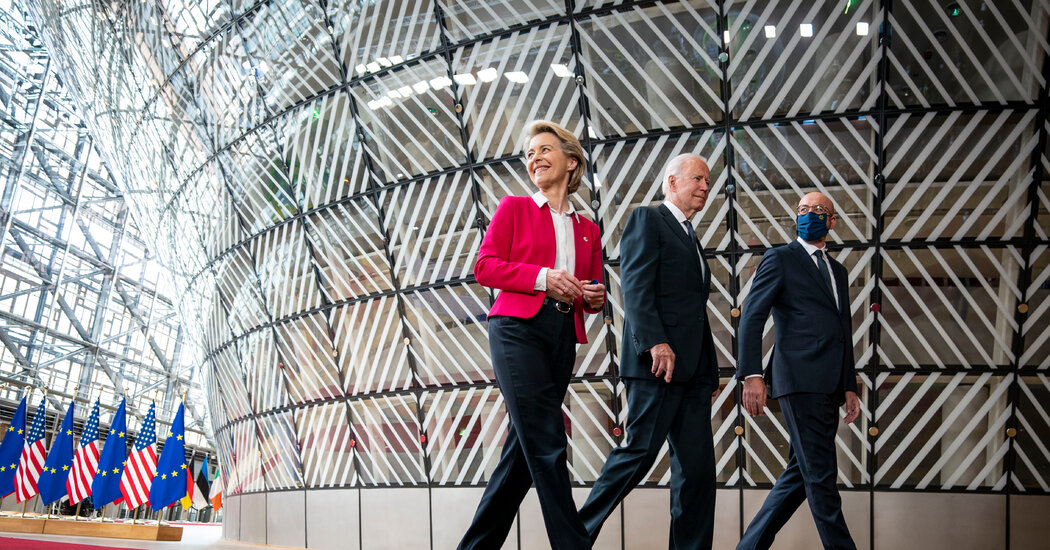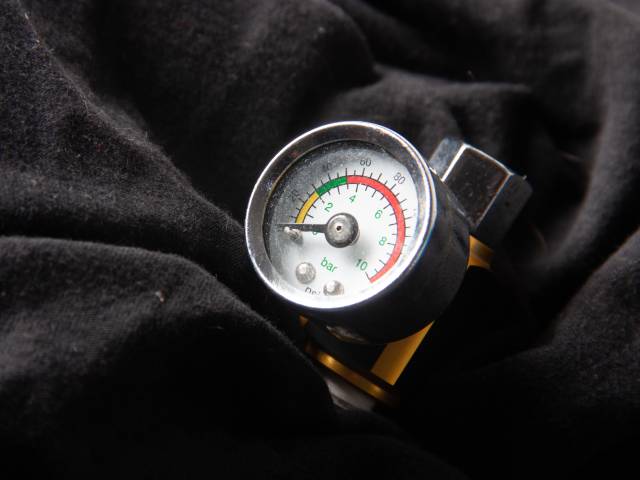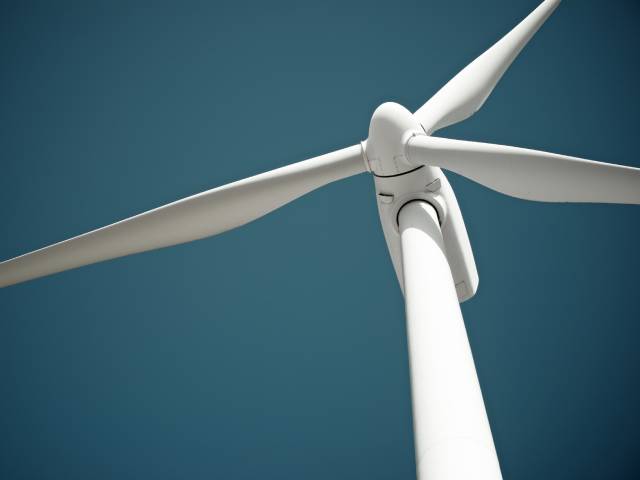

BRUSSELS — The United States and Europe on Tuesday agreed to put aside a 17-year dispute over aircraft subsidies for Boeing and Airbus and work together to counter China’s global ambitions to dominate key industries.
The agreement, which suspends the threat of billions of dollars in punitive tariffs on each other’s economies for five years, is a clear sign of President Biden’s seriousness in repairing relations with the European Union and getting the wealthy bloc on his side in what he regards as a generational challenge from the rise of a technologically advanced and autocratic China.
Mr. Biden sees Europe as an ally, not an economic “foe” as former President Donald J. Trump did, and he has pledged to work with the European Union to counter China’s military, economic and technological ambitions. While Mr. Trump also saw the dangers of an unbound China, he did little to try to bring Europe along, instead punishing it with tariffs. Mr. Biden is convinced that, as Asia as a whole grows in population and wealth, the democratic world that believes in the rule of law and multilateral institutions must do more to protect its economies and values.
“Europe is our natural partner, and the reason is, we’re committed to the same democratic norms and institutions, and they are increasingly under attack,” Mr. Biden said during remarks in Brussels.
“The Biden administration is clearly eager to de-escalate tensions with traditional allies while rebuilding a common front with them in getting tougher on China,” said Eswar S. Prasad, the International Monetary Fund’s former China chief. “In tandem with renewed U.S. leadership of the G7, it is becoming evident that the major Western economies are now uniting in their attempts to rein in what they view as unfair Chinese trade and economic practices.”
That will be a delicate task for Europe, which does a large amount of trade with China and does not see Beijing as a peer rival or a military one, as Washington increasingly does. But Europe has also understood that China’s open ambitions under Xi Jinping and its abuse of trading rules abroad and human rights at home makes it a much more complex partner.
The European Union now identifies China as “an economic competitor and a systemic rival,” no longer believing, as Chancellor Angela Merkel of Germany has long argued, that trade and engagement will bring about political moderation there.
Michael Pillsbury, the Hudson Institute scholar who was one of Mr. Trump’s top China advisers, cautioned that the Biden administration would “find it’s much tougher than they thought to get these allies to openly side with the U.S. on China strategy because of the Europeans’ heavy dependence on the China export market.” That includes Germany’s significant reliance on Chinese auto purchases.
German officials say they will need time to alter their export-driven economy that is currently so dependent on China, understanding that the Chinese will soon be able to manufacture for themselves some of the sophisticated machine tools they currently buy — and try to copy — from more advanced European firms.
The détente on Airbus and Boeing came as Mr. Biden met top European leaders in a U.S.-E.U. summit that also endorsed a new joint Trade and Technology Council to more formally consult on trade and technical standards. Part of the purpose of the council is to agree on how to limit Chinese digital ambitions in fields like artificial intelligence and cybersecurity and screen Chinese investments in those areas that could have security implications for Europe and the United States.
A senior American official said that the council would operate as an interagency body and coordinate with Brussels in priority areas like standards for artificial intelligence, quantum computing and biotechnology, supply chain resilience and export controls. European officials said its work would probably start with sensitive issues like semiconductors and 5G infrastructure.
The Boeing-Airbus agreement followed two days of intense negotiations in Brussels between Katherine Tai, the U.S. trade representative, and Valdis Dombrovskis, the E.U. trade commissioner. European member states approved the deal overnight.
“This really opens a new chapter in our relationship because we move from litigation to cooperation on aircraft — after 17 years of dispute,” said the European Commission president, Ursula von der Leyen.
After the meeting, Mr. Biden flew to Geneva, where he will meet President Vladimir V. Putin of Russia on Wednesday. Mr. Biden will be able to present himself there as the leader of the Western democracies, having first been to summit meetings of the Group of 7, NATO and now the European Union, where he has consulted extensively with allies.
“I’ve been making the case that the U.S. and Europe — and democracies everywhere — are stronger when we work together to advance our shared values like fair competition and transparency,” Mr. Biden said in a statement. “Today’s announcement demonstrates exactly how that can work in practice.”
In a briefing for reporters on the aircraft deal, Ms. Tai said that both sides had agreed to extend a suspension of tariffs for five years while working together to counter China’s investment in the aircraft sector, especially from state-run companies.
China’s state-sponsored aerospace manufacturer, Commercial Aircraft Corporation of China, completed the first public flight test of its passenger airliner in 2017, and is fast becoming a rival to both Boeing and Airbus in global aircraft construction. China’s airlines are also state-run, and Beijing can order them to buy domestically built planes, squeezing market share for Boeing and Airbus.
The United States and the European Union would work together, Ms. Tai said, “to challenge and counter China’s nonmarket practices in this sector in specific ways that reflect our standards for fair competition.”
In a post-summit news conference, Ms. Tai explained: “For almost 20 years we have been at each other’s throats, fighting each other in terms of competition between our industries. While we have been engaged in this fight, others are taking the opportunity to launch their own industries, and we have been too busy fighting each other to pay attention.”
But she cautioned that the agreement set limits on the subsidies that the European Union would be allowed to provide to Airbus, warning that the United States would reimpose billions of dollars in tariffs if subsidies by European Union countries crossed a “red line.”
“These tariffs will remain suspended, so long as E.U. support for Airbus is consistent with the terms of this agreement,” she said. “Should E.U. support cross the red line, and U.S. producers are not able to compete fairly and on a level playing field, the United States retains the flexibility to reactivate the tariffs.”
The agreement means that significant punitive tariffs estimated at $11.5 billion, on a wide variety of products including aircraft parts, wine, tractors, spirits, molasses and cheese, will continue to be suspended after both sides had agreed to do so in March while they tried to settle the dispute.
It is a critical moment for both companies, which are struggling to overcome a slowdown caused by the pandemic. Most within the industry expect it to be years before airlines and plane manufacturers can fully shake off the effects of the downturn.
Tuesday’s announcement isn’t expected to have an immediate impact on the companies. Boeing and Airbus have already begun unwinding the subsidies they enjoyed — Airbus had said that it would increase repayments of low-cost loans it received from multiple E.U. countries, while Washington has repealed a state tax break for Boeing.
Still, the agreement removes a persistent concern for both companies as they seek to lift sales around the world.
Mr. Biden’s approach to Europe is both political and practical: The European Union, given its enormous economic power as a market and as a trading bloc, has more impact on American life than any other multilateral institution. Mr. Biden wants more support from the Europeans on restraining the damaging effects of the rise of China.
Major countries like Germany, France and Italy are reluctant to join Washington in an adversarial relationship with China, but attitudes are hardening because of Chinese human rights abuses at home, trade practices and widespread industrial espionage. The European Union, for instance, has agreed on a voluntary investment screening program similar in concept to an American panel known as the Committee on Foreign Investment in the United States.
There remain other significant disputes between the United States and the European Union, most prominently another lingering case over Trump-era tariffs on steel and aluminum. In 2018, Mr. Trump used special “national security” provisions to impose the tariffs, which set off a larger trade war.
The European Union retaliated by targeting some $3.4 billion of American imports with tariffs on a range of big-name products, including Harley-Davidson motorcycles, Levi Strauss jeans and bourbon whiskey.
Brussels suspended its retaliatory tariffs for six months in May, hoping to negotiate a longer-term solution on the problem of steel overcapacity worldwide.
Mr. Dombrovskis has urged Mr. Biden to “walk the talk” of comity and drop those tariffs.
Alan Rappeport, Monika Pronczuk and Niraj Chokshi contributed reporting.
24World Media does not take any responsibility of the information you see on this page. The content this page contains is from independent third-party content provider. If you have any concerns regarding the content, please free to write us here: contact@24worldmedia.com

Why You Need To Improve Drainage on Your Property

Essential Tips To Shield Your Car Windows From Damage

Warehouse Optimization Tips To Improve Performance

How High-Humidity Climates Affect Pressure Gauges

How Is Global Health Improving Year After Year

Ways That You Can Make Your Land More Useful

Essential Materials Used in the Construction Industry

A Look Into 3 Aspects of Maintaining Wind Turbines

Key Factors To Know Before Using IoT Solutions

Avoiding Hazards: How Vehicle Manufacturers Keep People Safe